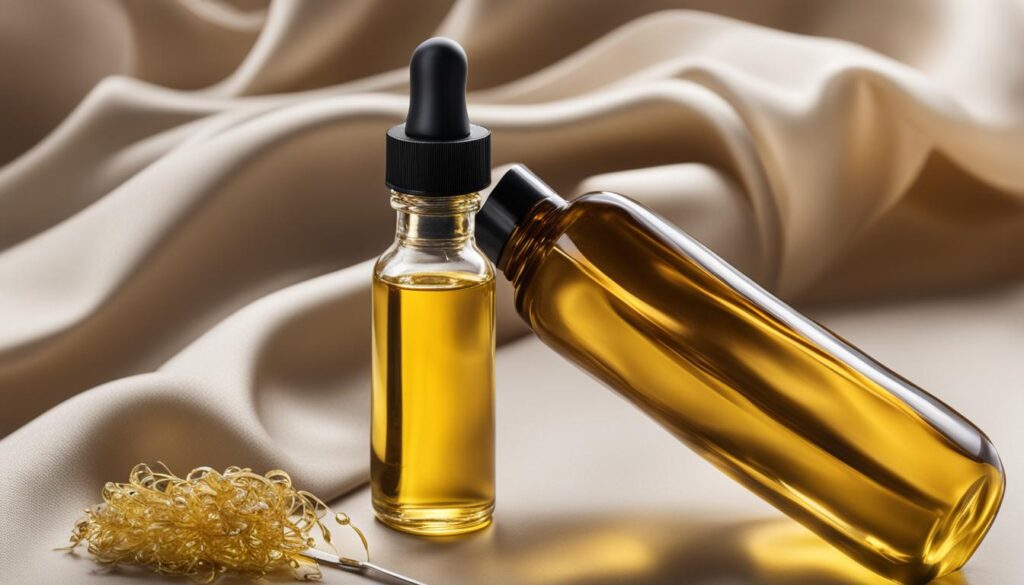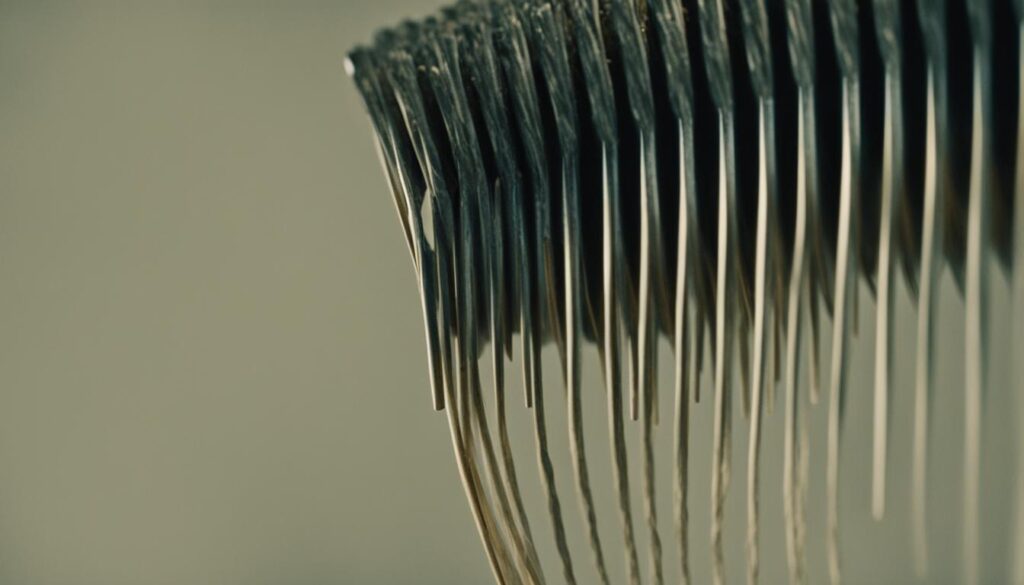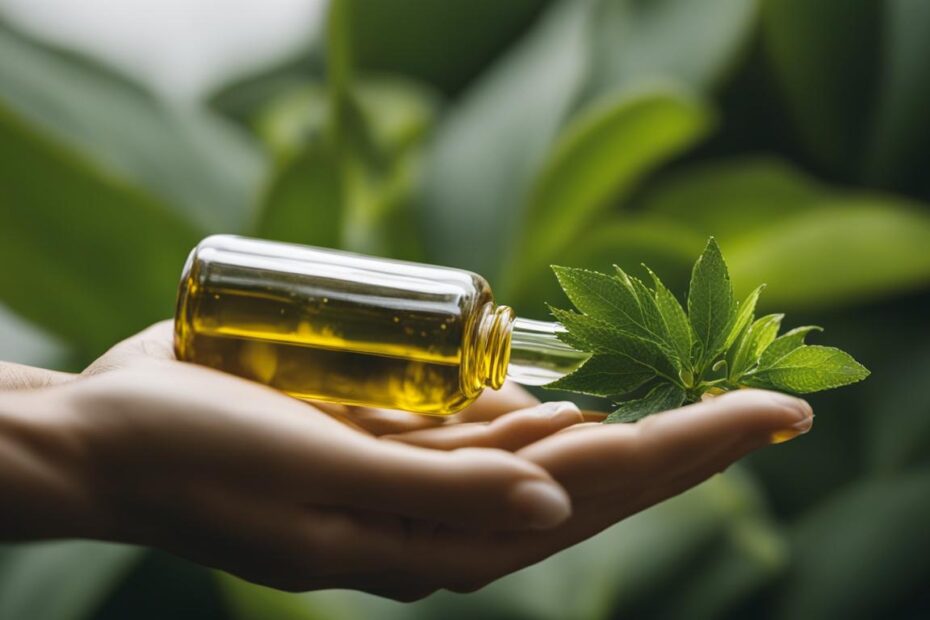Castor oil has long been used as a natural remedy to promote hair growth and improve hair health. While scientific evidence is limited, many people believe in its potential benefits. Castor oil is said to increase blood flow to the scalp, moisturize dry skin, reduce dandruff, and even promote hair growth in other areas.
Key Takeaways:
- Castor oil is believed to moisturize the scalp and promote healthier hair.
- It may increase blood flow, reduce dandruff, and improve the smoothness, strength, and shine of hair.
- Castor oil contains ricinoleic acid and omega-6 fatty acids, known for their anti-inflammatory properties.
- Using castor oil for hair growth involves massaging it into the scalp and hair, diluted with other natural oils.
- It is important to wash out the oil after a few hours and do a patch test for any allergic reactions.
How to Use Castor Oil for Hair Growth
If you’re looking to promote hair growth and improve the health of your hair, castor oil may be a natural solution worth considering. Castor oil is believed to have moisturizing properties and contains essential nutrients that can benefit your hair and scalp.
To effectively use castor oil for hair growth, follow these simple steps:
- Massage a few drops into your scalp: Start by massaging a few drops of castor oil into your scalp. Massage in gentle circular motions to stimulate blood flow.
- Apply to the midsection and ends of your hair: Once you have covered your scalp, distribute the remaining oil on your hands to the midsection and ends of your hair. This helps to nourish and moisturize the entire length of your hair.
- Dilute the oil if needed: Castor oil can be thick and sticky, which makes it challenging to remove from your hair. If preferred, you can dilute the oil with other natural oils such as coconut oil or jojoba oil. This makes the application process easier and helps to prevent buildup.
- Limit frequency to once a week: It is important not to overuse castor oil to avoid potential issues such as buildup and matting. Experts recommend using castor oil for hair growth no more than once a week.
- Wash out after a couple of hours: After applying castor oil to your hair, it is recommended to leave it on for about two hours. This allows the oil to penetrate the hair shaft. However, it is essential to wash the oil out thoroughly to prevent dryness.
Before incorporating castor oil into your hair care routine, it is advisable to perform a patch test. Apply a small amount of diluted castor oil to your skin to check for any signs of irritation or allergic reactions.
Did you know? Castor oil is rich in essential fatty acids and has anti-inflammatory properties. These properties are believed to promote hair growth and reduce inflammation in the hair follicles.
The Best Oils for Different Hair Types
When it comes to choosing the right oil for your hair, it’s important to consider your hair type and specific needs. While castor oil is a popular choice for promoting hair growth and health, there are other oils that can provide additional benefits for different hair types. Here are some top recommendations:
Jamaican Black Castor Oil

Jamaican black castor oil is derived from roasted castor beans and is particularly beneficial for those with thick, dry, and coarse hair. It is known for its deep moisturizing properties and can help to nourish and strengthen the hair strands. This oil is also believed to promote hair thickness and reduce breakage, making it an excellent choice for individuals looking to enhance the health and appearance of their hair.
Coconut Oil
Coconut oil is a versatile oil that works well for a variety of hair types. It is especially beneficial for individuals with dry or damaged hair, as it has excellent moisturizing properties. Coconut oil can help to strengthen the hair shaft, reduce protein loss, and improve overall hair health. It is lightweight and easily absorbed, making it suitable for fine or thin hair as well.
Argan Oil
Argan oil is rich in antioxidants and essential fatty acids, making it a great choice for promoting hair health. It is particularly beneficial for individuals with frizzy or curly hair, as it helps to tame frizz, add shine, and enhance manageability. Argan oil also provides hydration to dry and damaged hair, leaving it softer and smoother.
Jojoba Oil
Jojoba oil is similar to the natural oils produced by the scalp, making it an excellent choice for individuals with oily hair or a sensitive scalp. It helps to balance the scalp’s oil production, reducing excess oiliness without stripping the hair of essential moisture. Jojoba oil also aids in strengthening hair follicles, promoting healthy hair growth, and soothing a dry or itchy scalp.
Remember, when selecting oils for your hair, it’s essential to choose high-quality, cold-pressed options to ensure maximum benefits. Additionally, always perform a patch test before using any new oil to check for potential allergies or reactions.
Debunking the Claims: Scientific Evidence and Hair Loss
While many people believe in the benefits of castor oil for hair growth, there is currently no scientific evidence to support these claims. Hair loss can be caused by various factors, including underlying health conditions, stress, and aging. Consulting a healthcare professional is important if you are experiencing significant hair loss or considering using castor oil as a remedy. It is worth noting that castor oil may not be effective for treating hair loss, and there are other medical treatments and interventions available for hair loss.
However, castor oil does contain beneficial nutrients such as antioxidants and fatty acids, which are known to promote overall hair and scalp health. Despite the lack of scientific evidence for hair growth, many people still choose to use castor oil due to its moisturizing properties and potential benefits for the hair and scalp.
The Importance of Scientific Evidence
Scientific evidence plays a crucial role in determining the effectiveness and safety of various remedies, including castor oil. While traditional remedies have been passed down through generations and may have anecdotal evidence supporting their use, it is essential to rely on scientific research for conclusive results. Conducting well-designed clinical studies can provide valuable insights into the potential benefits and risks associated with using castor oil for hair growth.
Without scientific evidence, it is challenging to determine whether the claimed benefits of castor oil for hair growth are valid. Therefore, it is advisable to approach castor oil as a potential hair care remedy with caution and consult a healthcare professional for personalized advice.
Alternative Treatments for Hair Loss
If you are concerned about hair loss, it is essential to explore all available options for treatment. While castor oil may not be scientifically proven to promote hair growth, there are other medical treatments and interventions that have shown effectiveness in managing hair loss. These treatments may include medications, topical solutions, laser therapy, and hair transplantation.
Consulting a dermatologist or trichologist can help determine the underlying cause of your hair loss and develop a suitable treatment plan. They can provide expert guidance and recommendations tailored to your specific needs.
Promoting Hair and Scalp Health
Although castor oil may not be a cure for hair loss, it can still contribute to overall hair and scalp health. The antioxidants and fatty acids present in castor oil can help nourish and moisturize the hair and scalp, promoting shine and manageability. Incorporating castor oil into your hair care routine alongside other recommended practices, such as regular gentle hair washing, a balanced diet, and managing stress levels, can support the health of your hair and scalp.

The Importance of Consultation
Prioritizing consultation with healthcare professionals is crucial when addressing hair loss concerns or considering alternative remedies. They can provide accurate diagnosis, expert advice, and recommend evidence-based treatment options tailored to your specific needs and circumstances. It is essential to approach hair loss management with a holistic perspective, considering both medical interventions and lifestyle adjustments for optimal results.
Precautions and Tips for Using Castor Oil on Hair and Eyebrows
When using castor oil on your hair and eyebrows, it is important to take certain precautions and follow these tips for optimal results and safety.
Dilute for Easy Application
Castor oil has a thick consistency and a strong scent that some people find unpleasant. To make it easier to apply and tone down the smell, it is recommended to dilute the castor oil with another carrier oil such as coconut oil or jojoba oil. This will also prevent your hair and eyebrows from feeling weighed down by the heavy texture of castor oil.
Avoid Contact with Eyes
When applying castor oil to your hair and eyebrows, make sure to avoid getting it in your eyes. Castor oil can cause irritation or even infection if it comes into contact with your eyes. It is best to use a clean brush or Q-tip to apply the oil, ensuring that it only coats the hair and not the sensitive eye area.
Perform a Patch Test
Before applying castor oil to your skin, especially if you have sensitive skin, it is advisable to do a patch test. Apply a small amount of diluted castor oil to a small area of your skin and wait for 24 hours to see if any allergic reactions or irritation occur. This will help you determine if you have any sensitivities to castor oil before using it on a larger area like your scalp or eyebrows.
Leave on for a Few Hours or Overnight
To allow the castor oil to deeply penetrate your hair and eyebrows, it is recommended to leave it on for a few hours or overnight. This will give the oil enough time to nourish your hair follicles and promote hair health. However, make sure to cover your head with a shower cap or an old t-shirt to prevent the oil from staining your clothes and towels during the application.
Wash Off Thoroughly
After leaving the castor oil on your hair and eyebrows for the desired duration, wash it off thoroughly. Use a gentle shampoo and warm water to remove any residue and prevent your hair from becoming greasy or weighed down. Properly cleansing the oil will ensure that your hair and eyebrows are soft, nourished, and free from any buildup.
By following these precautions and tips, you can safely and effectively incorporate castor oil into your hair and eyebrow care routine. With regular use and proper application, castor oil may help improve the health and appearance of your hair and eyebrows.
Conclusion
While scientific evidence supporting the benefits of castor oil for hair growth and health is limited, many individuals still turn to this natural remedy. Castor oil is reputed to have moisturizing properties and contains beneficial antioxidants and fatty acids. However, it is crucial to exercise caution when using castor oil, as it may lead to complications such as acute hair felting. Additionally, it is not advisable to consume large amounts of castor oil. If you are experiencing significant hair loss or considering incorporating castor oil into your hair care routine, it is recommended to consult a healthcare professional.
Despite the lack of concrete scientific proof, castor oil remains a popular choice among those seeking natural hair care solutions. Its potential moisturizing effects and nutrient content make it an intriguing option. Nonetheless, it is important to remember that using castor oil correctly and in moderation is key to avoiding any adverse effects. For individuals who are grappling with significant hair loss or are contemplating the use of castor oil for their hair, consulting with a healthcare expert is strongly advised. They can offer personalized guidance and recommendations based on your specific needs.
In summary, castor oil has been utilized for hair care purposes for centuries, but its efficacy remains a subject of debate within the scientific community. While it may not be a scientifically proven solution for hair growth, many individuals find comfort in using castor oil as a natural remedy. Remember to exercise caution when incorporating castor oil into your hair care routine and seek professional guidance if experiencing notable hair loss concerns. Whether or not you choose to explore the potential benefits of castor oil for hair care, it is important to embrace a holistic approach to hair health and consider a range of factors, including proper nutrition, scalp care, and overall well-being.
FAQ
What are the benefits of using castor oil for hair?
Castor oil is believed to moisturize the scalp, reduce dandruff, and improve the smoothness, strength, and shine of hair. It may also increase blood flow to the scalp and promote hair growth. However, there is no scientific evidence to support these claims.
How should I use castor oil for hair growth?
It is recommended to massage a few drops of castor oil into the scalp and hair’s midsection and ends. To make the oil easier to apply, it can be mixed with other natural oils such as coconut or jojoba oil. However, it is important to dilute the oil and wash it out after about two hours to avoid buildup and dryness.
What types of castor oils should I look for?
Cold-pressed castor oils are believed to be of higher quality and more nutrient-rich. One popular variety is Jamaican black castor oil, which is made from roasted castor beans and is said to be beneficial for thick, dry, and coarse hair.
Is there scientific evidence to support castor oil’s benefits for hair growth?
Currently, there is no scientific evidence to support the claims of castor oil’s benefits for hair growth. It is important to consult a healthcare professional if experiencing significant hair loss or considering castor oil as a remedy.
What precautions should I take when using castor oil on my hair and eyebrows?
It is recommended to dilute castor oil with another carrier oil and to avoid getting it in the eyes. Doing a patch test beforehand is advisable to check for any allergies or irritation. Covering the head with a shower cap or old t-shirt during application can help prevent stains on clothes and towels.
